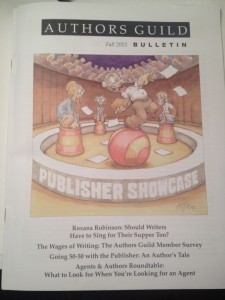Ginger Rue's Blog, page 4
January 4, 2016
How Long Does It Take to Write a Book?
Every time I go for a school visit, I get the same question: How long does it take you to write a book?
You’d think this would be an easy question to answer, but the truth is, I have no idea.
The first draft is just the beginning of a long, long process. And I’ve never really timed myself on a first draft anyway. Things such as illness, contract work, or family commitments may interfere with a first draft. Or maybe the draft just isn’t working and I know it and have to scrap it all and start from scratch. There’s no telling.
Once I do finish a draft, I send it to my agent. She edits. I rewrite. Then we do that a few more times before she sends it out to publishers. Then sometimes a publisher or two will show some interest in the manuscript but ask for some changes. So then I’ll make those edits and we’ll resubmit.
Then, once the manuscript sells (if it sells), the editor and I go through a few rounds of edits. Then a copy editor comes in and suggests more edits. And by the way, “copy editing” isn’t just looking for misspelled words. Copy editors create a “book bible” with all the details of the book (character names and relationships; colors of rooms, eyes, hair, whatever–every little detail contained in the book) and they question word choice, character motivation, and anything else they might catch. It’s a big job. Once a copy editor on one of my books caught a huge continuity error that my agent and editor and I had all missed!
After I go through and work on the copy editor’s edits, my editor sends the manuscript back to me and we all edit it a couple more times. How many edits does it take? It’s kind of like the old question about how many licks it takes to get to the center of a Tootsie Roll Pop. You lose count, but it’s a lot.
Think about all those edits, all those eyes, and then think about how often you’ve found an error in a book. It happens. Mistakes can still be made. Scary, isn’t it?
So, how long does it take to write a book? I couldn’t say.
December 23, 2015
How to Get Published
There’s plenty of advice on how to get published, but I’m going to tell you the real secret. Ready?
Submit. A lot.
I’ve been thinking about this for a long time, and I’m convinced that being published isn’t necessarily a mark of how incredibly talented you are. Yes, I think you have to have some talent as a writer, but the world is full of people with unrealized potential. What sets the published apart from the unpublished, in many cases, is determination. Years ago, when I was working on a magazine story, a friend told me, “You’re like a dog with a bone. You don’t let go!” I think that’s had more to do with any success I’ve had than my ability to turn a phrase. What sets the published apart from the unpublished is often their stubborn refusal to give up. They keep working and they keep submitting. I’m not particularly good at darts, but if I threw darts at a dart board for a long enough time, one of them might eventually hit the bull’s eye or somewhere close to it. I might even hit that bull’s eye more often than someone who is a better darts player but who rarely plays. Just the law of averages.
Now, this is not to say that you should send out a bunch of garbage and hope to get lucky. Quite the contrary. If you send out junk, eventually, editors and agents will remember your name. “She’s the one who sends the junk,” they’ll say to themselves when they see your letter or email. And to the round file you’ll go. So please don’t take this advice about submitting as my urging you to send out work that isn’t ready. Keep studying, keep working on your craft, and send out only things you can feel proud of…but put in the work regularly.
A recent item in the Authors Guild Fall 2015 Bulletin backs me up on this. Norman Mailer is quoted as having said, “In writing, as in so many pursuits, it’s not the most gifted but the most determined who succeed. John Berryman thought talent was no more than twenty percent of a poet’s makeup. This is probably true for any type of writer. Those we hear about are more blessed with luck and persistence than ability and skill.”
Also in the Bulletin this month is a good piece on finding an agent, which is the first step towards book publication. If you’re not getting the Bulletin, you can apply for membership in the Guild here.
October 21, 2015
Pickup Lines
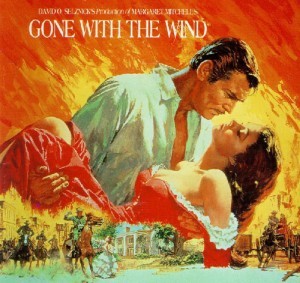
David O Selznick ignored Mitchell’s first line.
Yesterday I saw a silly pickup line on the internet. You say to someone, “You smell upsexy.” Then the person responds, “What’s upsexy?” And then you reply, “Not much. What’s up with you, sexy?” I thought I’d try it out on my husband that evening, just for laughs. So that night, I say, “You smell upsexy.” He looks at me like I’m crazy and then responds, “What does that mean?” Well, there goes my joke–although I actually laughed harder at my script’s going awry than I did at the actual joke.
What does a lame pickup line have to do with writing? Only this: I challenge you to think of the first line of your novel or story as a pickup line. Except not a lame one, of course. One that will get readers’ attention and make them want more…just as a pickup line is supposed to get someone’s attention and entice him/her into a larger conversation.
One of my all-time favorite first lines is from Gone with the Wind.
Many people believe that the enduring power of Gone with the Wind lies in its characterization of the heroine and/or the complexity of the love triangle. While all that is good stuff, consider the first part of the book’s irresistible first line: “Scarlett O’Hara was not beautiful, but men seldom realized it….”
If you’ve seen the movie, you know that Hollywood overlooked this first line when they cast the gorgeous Vivien Leigh as Scarlett. And while I can’t imagine any other actress in that role thanks to Leigh’s outstanding performance, I think the first few words of the book have a great deal to do with the novel’s power. Scarlett, though attractive, was not so beautiful that she didn’t have to rely on her wits to get what she wanted. And ultimately, it is her charm and cunning that drive the novel’s plot. I think every woman on the planet would like to know the secret Mitchell teases at in that first line. You mean this woman Scarlett wasn’t a beauty but somehow she made people think she was? How’d she do it? Can she teach me how to do the same thing? Hasn’t this promise in some form or another been a cover tease on every women’s magazine cover every month for the last…forever?
What’s your favorite first line and why?
August 31, 2015
“Let’s Get Rid of ‘Said’!” she said.
When I was in grade school, one of my favorite teachers did an exercise with us called, “Let’s Get Rid of ‘Said’!” The idea was that “said” is a boring, generic way to tag a writer’s dialogue. She was totally right. And yet, she was totally wrong.
Yes, “said” is a boring, generic word. But guess what? That’s exactly what you want. Other than an occasional “replied,” all your dialogue should be tagged with “said.” Anything else is the mark of a novice. Professional writers do not want their characters to state, announce, assert, claim, declare, disclose, reveal, pronounce, utter, or, for heaven’s sake, chortle. Therefore, step away from the thesaurus.
“But that’s so many ‘saids,'” you say. You’re right. But it’s OK. The idea is for the reader to gloss right over the dialogue tags and pay attention only to the dialogue itself. And gloss the reader does…as does the agent reading your work while thinking, “Thank goodness I’m dealing with someone who knows to use ‘said.'”
Trust me. Just use “said.”
There. I said it.
August 1, 2015
Six Rejections That Should Make You Keep Writing
Rejections. Every writer has gotten them. But how do you know when to keep trying and when to take a hint? Here are a few hallmarks of what I’d call “good rejections”–the kind that should encourage you to keep going.
1. There’s some outright encouragement. Did the editor mention that he/she enjoyed certain aspects of your manuscript? Remember that an editor has to fall head-over-heels in love with a book in order to take it on. Just as we don’t fall in love with every attractive person we meet, editors don’t make an offer on every good manuscript.
2. It’s not the right fit. If you get a rejection that says something to the effect of, “It’s not right for our line,” that isn’t an insult to your book. Remember that book imprints have a brand of their own–readers expect certain types of projects from them. Your book may be great but not in line with their brand.
3. It’s too similar to something else. It may be that your book is good but that the publisher has already acquired something too much like it. Let’s say your book is about a cat who speaks French. Unbeknownst to you, the publisher has a book coming out next year about a cat who speaks German. (It takes a couple of years from acquisition to book store shelves, after all.) This doesn’t mean that your book isn’t good; it just means there’s only so much room for multilingual felines on their list. Or maybe your book reminds them of another book they did several years ago with a similar gimmick, and that book didn’t do well for them. Or a competitor has a book with the same sort of gimmick. Any of these can keep you from getting a yes, but it doesn’t mean you shouldn’t keep trying.
4. They ask to see a revision. This is extremely encouraging because while the current version isn’t quite right, the editor sees something in your book that makes him/her willing to read it twice.
5. They ask to see something else from you. If the editor asks to be kept in mind for future submissions, your writing must be pretty good.
6. They take it to acquisitions. For an offer on a book to be made, everyone at the publishing house has to be on board. There are times when an editor loves a project but can’t convince the rest of the team to buy in. This is heartbreaking for the author (so close!) but ultimately, the most affirming of rejections. Someone in the publishing business loved your book enough to go to bat for it. That’s huge!
July 16, 2015
Voice: If You’ve Got It, Flaunt It (Because You Can’t Teach It)
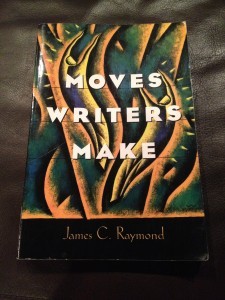
One of my favorite writing instruction books, but it can’t teach voice.
Years ago, my editor-in-chief at Sweet 16 magazine (a moment of silence for that awesome publication!), told me she liked my voice. It was a compliment that meant a lot to me, but what she said after that made a real impression, too. I’ve never forgotten it. “You know,” Mary Lou said offhandedly. “Voice is the one aspect of writing that can’t be taught.”
I thought about that long and hard. I’d taught English for years and had taken pride in helping writers grow, but had I ever TAUGHT voice? I realized I hadn’t. Mary Lou was absolutely right. I could teach sentence variety, I could build vocabulary, and I could help students learn to organize their thoughts, but I couldn’t teach voice.
Sometimes it’s hard for teachers to even convey to students what voice is. It’s just that special something that some writers have. It’s akin to style, but it’s beyond that. I think it’s simply a gift. Gifts can be developed, but teachers can’t teach students to have a voice.
Think of someone you know who can make any story special just in the way he/she tells it. Off the top of my head, I can think of three friends with special voices. My friend Cita, for instance, English teacher extraordinaire, could tell me about a simple trip to Walmart and have me in stitches. Every story she tells is perfectly paced and includes just the right amount of detail and delivers her witty take on life. Another friend, Shawnelle Eliasen, has this beautiful, serene feel to her writing that comes from her unique voice. She makes the everyday sublime. I love her voice because it’s so different from mine. Reading her work makes me feel like I’ve snuggled up in a blanket. One of my editors at Guideposts, Rick Hamlin, once described Shawnelle’s writing as “elegiac”–and that brings me to Rick’s voice: always the perfect word…not the almost-perfect word, but THE perfect one. Although his work is always accessible, Rick frequently uses words I haven’t seen since my college classes in Renaissance poetry or literary criticism. He once cautioned us to make sure our writing wasn’t “mawkish”–and I think he’s the only person I’ve ever heard actually SAY that word out loud; it’s just one of those perfect words that rarely gets its day in the sun. That’s what I love about Rick’s voice–the way he makes big, perfect words seem so off-the-cuff, like he’s not even trying. (To be fair, he’s not. He just does it because his voice, his gift, works that way.)
A great example for teachers who want to convey to students how important voice is? Have them read the passage in The Adventures of Tom Sawyer in which Mark Twain describes a fly in church. It’s a fly, for crying out loud, but even this, in the hands of Mark Twain, is a total hoot. It’s not the subject matter; it’s the writer’s voice.
May 15, 2015
Breaking a Law of Writing

Stuff I don’t know how to use #424.
“I didn’t know you were a drummer!” said my agent. She’d just finished my manuscript about a middle-school girl drummer who starts a rock band.
“I’m not,” I said. “At all.” Fact is, I lack both coordination and rhythm–things that are kind of important for drummers.
So what was I doing writing a book about a drummer? Isn’t “write what you know” one of the unbreakable laws of writing?
Nope.
For a while now, I’ve been skeptical of the “write what you know” advice we all got as creative writing students. I mean, you can’t swing a dead cat (what an idiom!) without hitting a dystopian novel, and certainly these writers haven’t lived in a society that starves people for entertainment purposes or what-have-you. And besides this, if I’m limited to writing what I know, the sad fact of the matter is that I’m going to run out of stuff to write. (Although I’m sure my novel about a woman folding laundry would be positively riveting.)
I started asking around and eventually did some heavy research (OK, Google search) and found that I’m onto something. A creative writing teacher at Harvard agrees with me. Yeah, what can I tell you? I just go around all the time having these Harvard professor thoughts. Ha! But it was pretty affirming. (And then I tried to help my middle schooler with basic math, and the feeling that I knew anything at all quickly passed.) I’d encourage you to head over to The Atlantic‘s website and read what Bret Anthony Johnston has to say in “Don’t Write What You Know.” It’s good stuff.
Oh, by the way, I did take a few drum lessons so that I could write my book with some measure of authenticity. But ultimately, the book isn’t about being a drummer so much as it’s about the protagonist’s becoming comfortable in her own skin–a goal that’s universal whether or not one happens to start a middle school band. The drum lessons simply helped me add texture…and reminded me that I should really work on my writing instead of trying to make it as a musician.
I’m finding more and more that no matter the particular circumstance, writing that connects with the reader centers around our shared human nature more than our location or background or any other outward factor. So when you’re deciding whether or not to write what you “know,” realize that you actually know a lot more than you think you do, and take some risks.
March 30, 2015
Four Things Public Speakers Can Do, But Writers Can’t

Less scary than a blank piece of paper? (photo from levelupliving.com)
For a short while in my teaching career, I taught public speaking in addition to teaching writing. I loved teaching public speaking, mainly because the students seemed to take it so much more seriously than they did writing instruction. Most kids are perfectly willing to slap some words on a piece of paper in study hall seconds before a writing assignment is due and think nothing of it–after all, who cares if the teacher is impressed? But it’s an entirely different matter to present ideas that are unorganized and ill-conceived to an entire room of one’s peers. I found that the students who took public speaking took all the instruction about getting attention, staying focused and organized, and using relevant examples to heart and were better writers because of it. Good public speaking skills translate into good writing skills. But there are some things public speakers can do that writers typically should not. (Note: The list below does not apply to technical writing, where all bets are off when it comes to style.)
1.) Writers can’t come right out and say, “This paper is about.” A good public speaker has clear markers–so clear that they can’t be missed by the listener. Hearing is fleeting–you can’t go back and re-hear a speech in real time (thank goodness for YouTube). Not so with writing, where subtlety can be highly desirable. Speaking and writing, while related, are two distinct forms of communication. Public speakers are advised to “KISS” (Keep It Simple, Stupid) while writers are allowed a more artful style. In fact, I don’t know who started the idea that students should write papers that say “I am going to tell you about,” or “This paper is about,” but please stop it. It’s dreadful writing. It works for public speakers, but not for writers.
2.) Writers can’t say, “This paper has three points.” I love it when a speaker tells us from the get-go how many points his speech has. This is a way of making a contract with the listener: Hang in there with me for three points and then I will stop talking and you can go to the bathroom. Really, I promise. The listener thinks, OK, you’ve got a deal. But writers need to use a little more art.
3.) Writers can’t just say, “In conclusion.” You know that feeling when you’ve listened to a speech that’s gone on too long, and the speaker finally says, “In conclusion,” and you want to scream, “Praise God from Whom all blessings flow!”? You can almost reach out and touch an audience’s relief when a speaker wraps up, even if it was a really good speech. So the phrase “in conclusion”(or something to that effect) is a gift for both speaker and listener. But I’d never let my writing students off so easily. I had a rule in my class that if nine out of ten people would approach a writing task this way, then you can’t do it that way. It’s too easy. One of my former colleagues used to write on his AP 12 students’ papers this simple command: “Do better.” Exactly. Don’t be lazy; do better.
4.) Writers can’t simply rehash what they’ve already said. I know…written conclusions are hard. They just are. There’s no formula I know of for a good one. They take a little bit of agony each time. At some point in middle school, I thought I’d found a way around this. I devised a formula for conclusions that I thought no English teacher could resist. I ended every paper with something to the effect of, “And that is why [insert author’s name here] remains one of the most important figures in [English/American] literature.” I thought it was foolproof: I gave the writer some cheap praise and boom! Done! Isn’t that what teachers want, even more than one of those slick, plastic paper covers? (Please don’t use those things. They are icky.) Thank goodness my teacher in eleventh grade told me it wasn’t going to fly anymore. She forced me to “do better.”
While I believe that people can be taught to be competent writers even if they don’t like writing, the fact remains that writing is an art, not a science. I don’t know of any better way to do it than to just work really hard until it’s right. And with enough practice (and the aforementioned agony), you’ll develop a sense of when that is.
March 6, 2015
In Which I Juxtapose a Metal Power Ballad and Writing Instruction
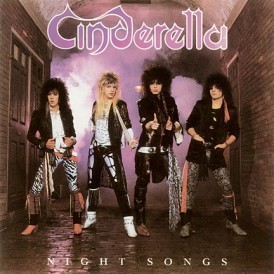
Had the album, went to the concert…oh, yeah!
Remember the 80s hair band Cinderella? Sure you do. Their lead singer had that awesome screeching voice and everything they did was so marvelously loud. They rocked! And do you also remember when all the metal bands went through the power ballad phase and Cinderella sang that one about writing called, “Don’t Know What You Got (Till It’s Gone)”?
OK, that song wasn’t really about writing. But it could’ve been. Because that’s the song that has been playing on repeat in my head the past few weeks as I search for old copies of Writing! magazine.
Writing! was a Weekly Reader publication that I used in my English classes back in the day. It was genius: every issue had articles about different aspects of writing, and the editors somehow made those topics relevant and even kinda cool to middle school and high school kids. I used to freelance for them on occasion. (Tales of yore say that a then-unknown John Grisham did, too, though I can’t verify that. But I wouldn’t be surprised because the magazine was just that good.)
But like all things that are too awesome for this world, Writing! vanished, leaving a void that no other educational magazine can ever fill.
Recently, I began searching for old copies of Writing! so that I could hoard them up for future instruction. Can’t find them anywhere. Not even on eBay. And that’s saying a lot when you consider that on eBay, you can find almost anything, including this and this.
I resorted to contacting Weekly Reader (no luck) and General Learning Communications, the company that created the magazine (also no luck), and even looking up the former editor-in-chief online. I couldn’t find him (there were a few people with the same name–eventually, I may contact all of them in my quest), so I wound up tracking down another freelancer who had worked regularly for Writing! She promised to send me photocopies of her old stories for them. I am beyond stoked–I’ve checked my mail with great anticipation each day since her email. Still, I wish I could have a complete library of original copies. Why, oh why, didn’t I save them all? (Cue the Cinderella song here.)
Writing! approached the study of literature the way I wish all writing classes could be taught: with an emphasis on HOW the writer does what he/she does, not just the work’s deep hidden meanings. Many lit textbooks are arranged by common themes, but I’ve never been able to get my head around that. I’ve always taught by genre or with an eye toward craft. I think students miss so much when studying, for example, White Fang without an emphasis on the importance of point of view (a wolf as the POV character? who knew that could work?) or say, Holes without dissecting the structure (yes, it’s a good story, but it’s the way the author interweaves the two plots that makes the book genius, in my opinion). It’s not enough to just tell kids that something is a great work of literature…let’s break it down and show the choices the writer made in order to create that great work. Maybe in today’s high stakes testing culture, that’s just not possible anymore. Maybe that’s why Writing! folded. I don’t know, but it makes me sad.
I’d love to hear from teachers who tackle the thematic unit approach to teaching lit. Do you think it accomplishes the same mission, or are there other benefits to this method that I haven’t considered? Please share.
Oh, and if you happen to know where I can get copies of Writing! magazine, please please please please please drop me a line.
February 9, 2015
Harold Bloom Was Really Talking about Alice
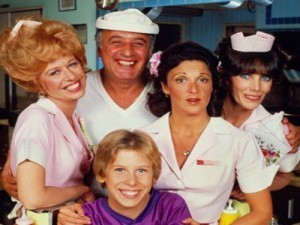
All literary criticism should reference ALICE. (photo: snipview.com)
In college, I had to read a scholarly work called The Anxiety of Influence by Harold Bloom. The gist of it was this: poets need to read other poets, but how do you make sure that you don’t wind up sounding like them and thus lose your own voice? I always thought Bloom’s argument was spot on, probably because all through college and my early twenties, I was doing some very bad JD Salinger writer-karaoke. Shortly thereafter, I immersed myself in so much Faulkner that I could barely carry on a normal conversation without sounding like I’d just ridden into town from Yoknapatawpha County.
The best writers have these amazing voices that beg to take up lodging in your brain. There’s so much you can learn from them, but if you’re not careful, your work becomes derivative. Ezra Pound told TS Eliot when Pound was editing The Waste Land–the actual intention of which was to reference other works of art, “Pope has done this so well that you cannot do it better….you cannot parody Pope unless you can write better verse than Pope–and you can’t.” Ouch! If that doesn’t give you pause as a writer, what will? I mean, if someone as beyond brilliant as Eliot gets smacked down for being a pale shadow of another writer, what chance do the rest of us have?
Problem is, we can’t really write in a vacuum. Every writer has influences, and the more of them you have, the richer your voice will ultimately become. But it’s hard to come up with something truly original when you’ve seen it all. Once in a poetry workshop I took, a student read a narrative poem, only to have a classmate remark, “I think I saw this once on Alice.” The professor’s insightful reply? “That’s the problem. We’ve seen everything before…on Alice.” It’s stuck with me all these years because he was so right. And I’m especially jaded because back in the days before DVR, Alice was what was on TV when we got home after school, and my brother and I watched every episode at least twice. I have, indeed, seen it all on Alice. (I should point out here that Harold Bloom wrote his book a few years before Alice premiered. Otherwise, he probably would have made the same comment as my professor.)
Because I’m so jaded, if a new book reminds me of an older book, I sometimes automatically assume it will derivative of the first one. For example, when I heard about Maya Van Wagenen’s bestseller Popular: Vintage Wisdom for a Modern Geek, my first thought was, “Oh, some savvy editor decided to take the premise of Meg Cabot’s How to Be Popular and get some teenager to stunt journalism it.” Nevertheless, I had to read it because how could I not? It’s a great premise, even if I’d seen it before in fiction.
I admit I didn’t have high expectations for the book. I expected it to be cutesy and fun…and it was fun. But the author went beyond that. She took something I’d seen before and made it her own. Not just because it was nonfiction instead of fiction, but because the book was so personal and honest. Not everything in the book was about the popularity experiment. When she wrote of her favorite teacher dying of cancer, the lump in my throat soon became tears flowing down my cheeks. The book wasn’t merely about popularity–it was about Maya, a real girl I began to root for more and more with each chapter.
I don’t know if Maya Van Wagenen ever even heard of Meg Cabot’s book before she wrote hers. After reading Maya’s book, I no longer believe it was dreamed up by an editor who went looking for a teen writer. It all feels genuine and honest. I think this young author is the real deal.
Yes, some writers skip the JD Salinger karaoke phase altogether and blast onto the scene with a compelling voice at a young age, and they sound so fresh and honest that they make us forget what we thought we knew about the stories they tell. The rest of us just have to keep trudging along….

